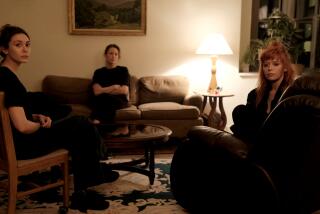Review: ‘Quartet’ retains its elegant, honest sordidness 38 years later
The Merchant-Ivory-Jhabvala canon of award-winning, beloved literary adaptations and cross-cultural period dramas lasted more than four decades, and in the middle sits 1981’s mostly forgotten “Quartet,” based on Jean Rhys’ 1928 novel, and not unlike one of the lonely, marginalized figures from Rhys’ many sad tales of untethered, ill-treated young women.
An evocative depiction of dissolute 1920s Paris starring Isabelle Adjani, Alan Bates, Maggie Smith and Anthony Higgins as woozy game pieces in a four-way snarl, its initial release was a brief celebration in arthouse circles of the then-20-year partnership between director James Ivory and producer Ismael Merchant, most of whose films (the better ones, typically) were written or co-written by novelist Ruth Prawer Jhabvala.
Now that it’s being re-released with a 4K restoration, “Quartet” offers a chance to celebrate this trio all over again, especially because it never fit neatly into their more widely known oeuvre of tasteful, class-conscious romances in stately manors (“A Room With a View,” “Howards End”). The tone of “Quartet” is darker, its psychologies messier, and the period in question lends itself more to bad behavior in constricting interiors (smoky cafes, seedy hotels, cramped parties) than warm companionships nurtured in the lush, open countryside. But with a new chance at rediscovering this long-sidelined swirl of Jazz Age emptiness and romantic predation, its collaborators’ reputation as dedicatedly sophisticated interpreters of era-specific fiction ought to be further burnished.
Adjani plays Marya Zelli, a doe-eyed Parisian ex-chorus girl of West Indies heritage living in Bohemian bliss with her crafty Polish husband, Stephan (Higgins), who sells stolen objets d’art. When Stephan is arrested and thrown in jail, the centime-less, abandoned Marya becomes an objet d’art herself to a married pair of wealthy British expats: H.J. Heidler (Bates), a dominating figure who fancies himself an arts supporter with an eye for up-and-comers, and his wife, Lois (Smith), who paints, pouts and manages her husband’s whims, one of whom, we quickly realize, is Marya.
After the Heidlers persuade Marya to move into their spare bedroom, H.J. persists in starting a sexual, controlling relationship with their vulnerable guest, while Lois unsettlingly abides in what increasingly appears to be their latest stab at staving off social malaise via sadomasochistic couples’ therapy. Even after Marya catches on to what these bored vampires are up to — a situation believed to have been autobiographically based on Rhys’ own fraught affair as a young, down-and-out writer with married author-mentor Ford Madox Ford — she’s hardly equipped to deal with her own feelings for both her husband and H.J., nor the ramifications of her tryst when Stefan re-enters the picture. Then there’s the small problem of what H.J.’s penchant for waifs in “little girl frocks” led to the last time he indulged and discarded: his conquest’s most unpleasant suicide.
Ivory, like an entertaining party host, fills cinematographer Pierre Lhomme’s lamp-lit interiors with period cosplayers of all sexualities, energies and temperaments (Judy Moorcroft’s wardrobes and Jean-Jacques Caziot’s set designs are exquisite), and keeps the Art Deco air circulating with a refined yet sinister perfume to accompany Jhabvala’s biting adaptation.
Not every performance is dialed in, but the performers themselves are a fascinatingly vinegary cocktail. Adjani is miscast but fragrantly so, because at heart she’s alive to Marya’s contradictions as victim and participant. (She won best actress at Cannes 38 years ago for “Quartet.”) Bates, admirably unconcerned with what you’ll think of him, tends to H.J.’s toxic self-absorption like a man possessed, while Smith — only a few years out from her Oscar-winning portrayal of uxorial denial in “California Suite” — turns the less-sympathetic version of a performative wife into a small tour de force of gnarled suffering. Only Higgins remains unimpressive beyond the glowers he gives from behind bars during Marya’s visits.
Whether the arc of Marya’s fate feels overly engineered to you or not, “Quartet” retains its power to unsettle in its accumulation of cuts and bruises, the rare Merchant-Ivory-Jhabvala effort that mines a glamorized past not for nuanced dignity but for a kind of elegant, honest sordidness.
------------
‘Quartet’
Rated: R
Running time: 1 hour, 41 minutes
Playing: Starts May 17, Laemmle Royal, West Los Angeles
More to Read
Only good movies
Get the Indie Focus newsletter, Mark Olsen's weekly guide to the world of cinema.
You may occasionally receive promotional content from the Los Angeles Times.










